Did you know that some of the symptoms you experience as a new mom could be related to postpartum inflammation caused by hormone imbalances? Postpartum inflammation goes beyond swelling feet and edema. It’s a complex process that is an expected part of healing but it doesn’t have to taint your postpartum experience.
While many new moms expect exhaustion, mood swings, and body aches to be part of the experience, few realize that chronic inflammation is often the root cause of these lingering symptoms. Inflammation is a natural part of healing after childbirth, but when left unchecked, it can lead to prolonged fatigue, brain fog, anxiety, joint pain, and even autoimmune conditions.
The good news? Postpartum inflammation is treatable—and even preventable—with the right nutrition, supplements, and targeted lab work. Understanding the role of hormones like cortisol, estrogen, and progesterone in regulating inflammation can help new moms take proactive steps to feel their best.
How Inflammation and Postpartum Hormones Are Connected
During pregnancy, a woman’s immune system is suppressed to prevent the body from attacking the baby as a foreign invader (Cincinnati Children’s). After birth, the immune system rebounds rapidly, sometimes leading to heightened inflammation. This inflammatory response is necessary for healing but can become dysregulated due to hormonal imbalances, stress, and nutrient depletion.
The key hormones that influence postpartum inflammation include:
1. Cortisol (The Stress Hormone)
Cortisol is the body’s primary anti-inflammatory hormone. During pregnancy, levels are naturally high to help with fetal development, but after delivery, they drop suddenly. This sharp decline can lead to:
- Increased sensitivity to stress
- Fatigue and brain fog
- Joint pain and muscle aches
If cortisol levels remain too low postpartum, the body struggles to regulate inflammation, leading to prolonged swelling, autoimmune flare-ups, and mood disturbances. On the other hand, chronic stress can keep cortisol too high, contributing to anxiety, postpartum depression, and even difficulty losing weight.
2. Estrogen & Progesterone: The Hormone Balance Duo
Estrogen and progesterone both have anti-inflammatory effects during pregnancy. However, after birth, these hormones plummet drastically, contributing to:
- Mood swings and emotional sensitivity
- Increased inflammation and joint pain
- Brain fog and memory issues
Low estrogen levels can also impair the production of serotonin and dopamine, neurotransmitters essential for mood regulation. This is why some women experience severe postpartum depression or anxiety.
Progesterone, known for its calming effects on the nervous system, also plays a role in regulating inflammation. When progesterone is too low postpartum, moms may feel irritable, restless, and prone to anxiety or postpartum rage.
3. Prolactin & Oxytocin (The Breastfeeding Hormones)
Prolactin is essential for milk production and has immune-modulating effects. However, excessive prolactin levels (common in breastfeeding mothers) can sometimes trigger inflammation and contribute to postpartum joint pain or thyroid dysfunction.
Oxytocin, the “love hormone,” is released during breastfeeding and counteracts stress by reducing cortisol levels. This hormone has powerful anti-inflammatory benefits, promoting healing and emotional bonding.
The Effects of Postpartum Inflammation on Recovery
When inflammation is well-regulated, it promotes healing and tissue repair. But if inflammation persists beyond the normal postpartum period, it can contribute to:
1. Prolonged Physical Recovery
- Swollen joints and persistent pain
- Slow wound healing (especially after a C-section or perineal tearing)
- Muscle stiffness and tension
Many women mistake these symptoms for normal postpartum discomfort, but they can indicate an underlying inflammatory response that needs attention.
2. Mental Health Struggles: The Inflammation-Brain Connection
- Postpartum depression and anxiety
- Irritability and mood swings
- Brain fog and difficulty concentrating
Inflammatory cytokines (proteins released by the immune system) can cross the blood-brain barrier, disrupting neurotransmitters like serotonin and dopamine. This is why chronic inflammation has been linked to depression, anxiety, and postpartum mood disorders.
3. Gut Health & Autoimmune Triggers
- Bloating, food sensitivities, and leaky gut
- Autoimmune conditions like Hashimoto’s or rheumatoid arthritis
- Blood sugar imbalances and insulin resistance
The postpartum drop in estrogen and progesterone can disrupt gut health and gut bacteria, leading to increased intestinal permeability (leaky gut). This allows toxins and undigested food particles to enter the bloodstream, triggering inflammation and potential autoimmune reactions.
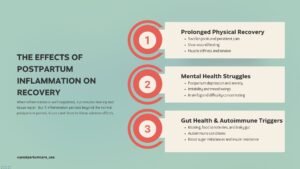
How to Reduce Postpartum Inflammation Naturally
Addressing postpartum inflammation requires balancing hormones, supporting the immune system, and ensuring optimal nutrient intake. The most effective way to do this is through comprehensive lab testing to identify hormonal imbalances, vitamin deficiencies, and inflammatory markers. Once identified, a targeted nutrition and supplement protocol can make a dramatic difference.
1. Optimize Nutrition for Inflammation Control
- Eat anti-inflammatory foods like wild-caught salmon, leafy greens, turmeric, and bone broth.
- Limit processed foods, sugar, and refined carbohydrates, which spike inflammation.
- Consume magnesium-rich foods (avocados, nuts, spinach) to support hormone balance and relaxation.
2. Regulate Cortisol Naturally
- Prioritize rest and recovery. Even short naps help stabilize cortisol.
- Use adaptogenic herbs like ashwagandha or holy basil (safe while breastfeeding) to support adrenal function.
- Incorporate deep breathing, yoga, or gentle movement to reduce stress and inflammation.
3. Support Estrogen & Progesterone Balance
- Flaxseeds and cruciferous vegetables help detox excess estrogen.
- Magnesium supports progesterone production, promoting calmness and reducing anxiety.
4. Improve Gut Health & Reduce Autoimmune Risks
- Take a high-quality probiotic to restore gut bacteria balance.
- Increase fiber intake from fruits and vegetables to support digestion.
- Hydrate well to flush out toxins and reduce bloating.
5. Use Targeted Supplements for Hormonal Support
Postpartum inflammation and hormone imbalances cannot be corrected with guesswork. The best approach is to get lab testing and create a customized supplement plan.
Common lab tests include:
✔️ Cortisol testing (to assess adrenal function)
✔️ Comprehensive hormone panel (to check estrogen, progesterone, and prolactin levels)
✔️ Inflammatory markers (CRP, homocysteine)
✔️ Micronutrient testing (to identify deficiencies in magnesium, zinc, vitamin D)
Based on results, a personalized postpartum recovery protocol may include:
✔️ Magnesium glycinate (supports relaxation and hormone balance)
✔️ Vitamin D3 + K2 (reduces inflammation and supports immune function)
✔️ Omega-3 fatty acids (reduce joint pain and improve mood)
✔️ Curcumin & resveratrol (natural anti-inflammatory compounds)
This is not medical advice. You need to speak with one of our providers to get the supplement doses and nutrition plan customized for you and your needs.
Final Thoughts: A Holistic Approach to Postpartum Recovery
Postpartum inflammation is not something moms have to live with. If you’re struggling with chronic fatigue, mood swings, brain fog, or joint pain, know that there are solutions. The key is to understand what’s happening inside your body through comprehensive lab testing and then use targeted nutrition and supplementation to support healing.
You don’t have to navigate this alone. At Postpartum Care USA, we specialize in advanced lab testing and personalized postpartum recovery plans to help new moms feel their best. If you’re experiencing symptoms of inflammation and hormone imbalance, schedule a consultation today to start your journey toward healing.
Your postpartum experience doesn’t have to be defined by exhaustion and discomfort. With the right approach, you can reduce symptoms of inflammation during your postpartum recovery.
Pin This for Later:
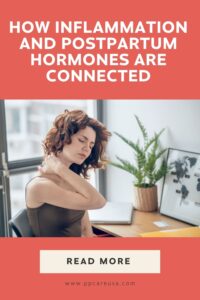
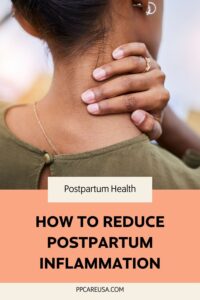
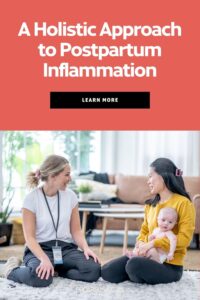
References:
Postnatal Depletion
Meet the Team
Our Services
Supplements
A virtual healthcare clinic that helps postpartum mamas recover from postnatal depletion syndrome with a holistic approach.
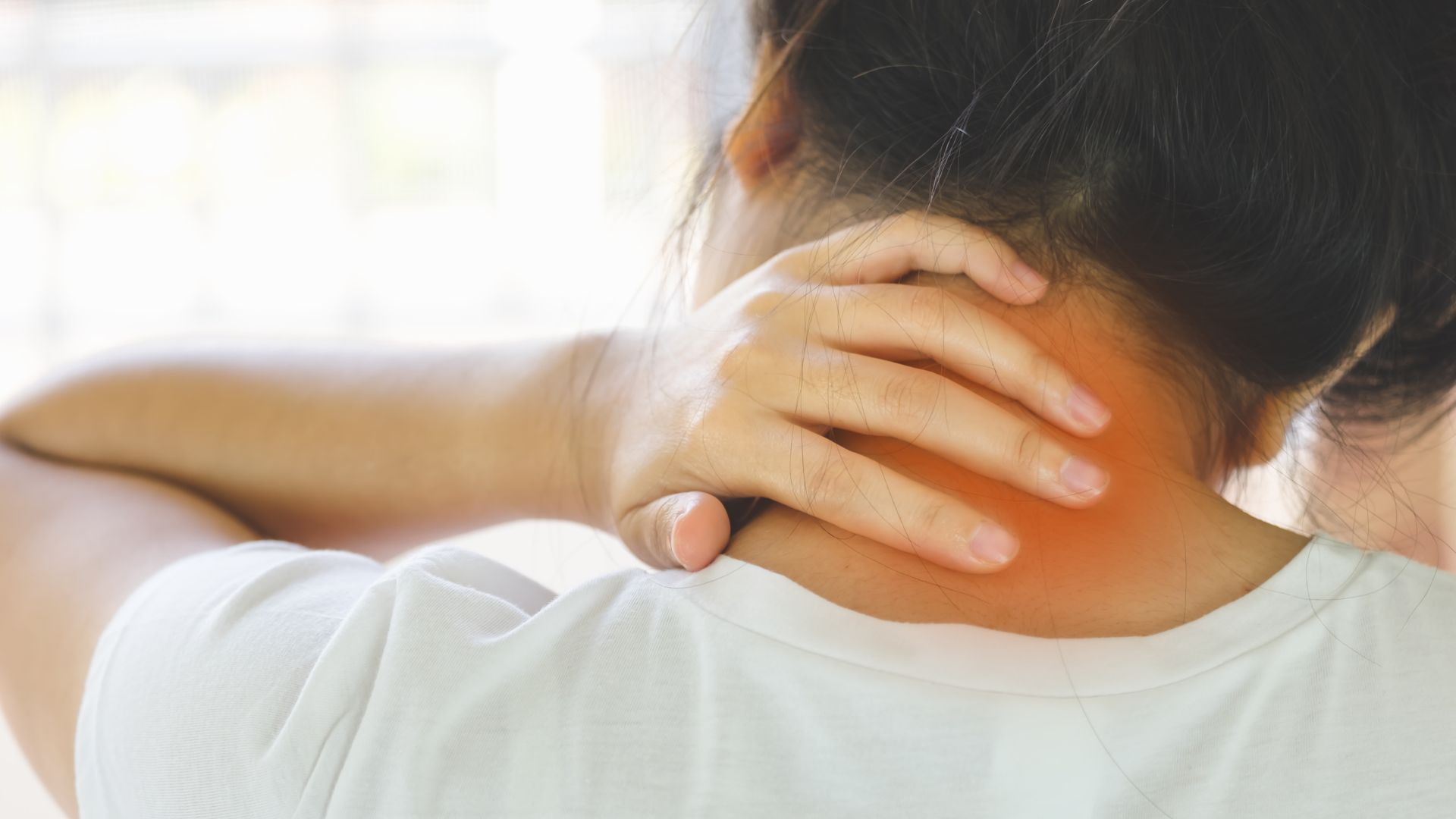
Get in touch